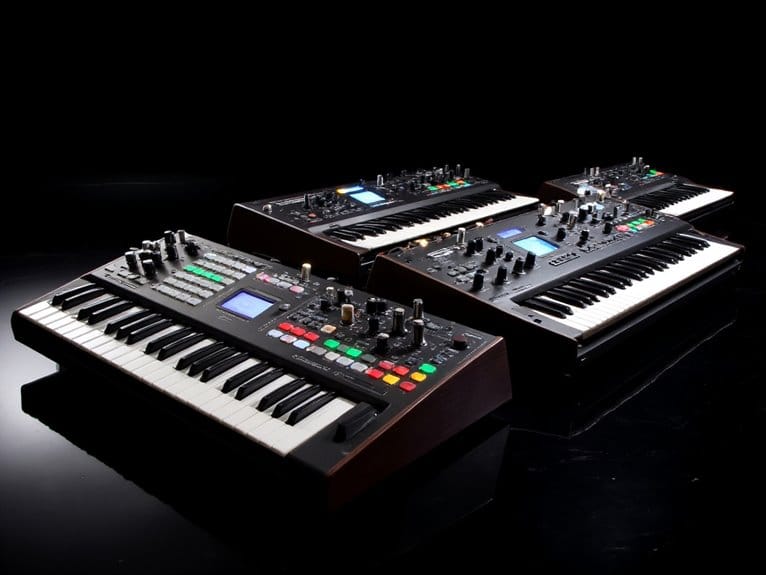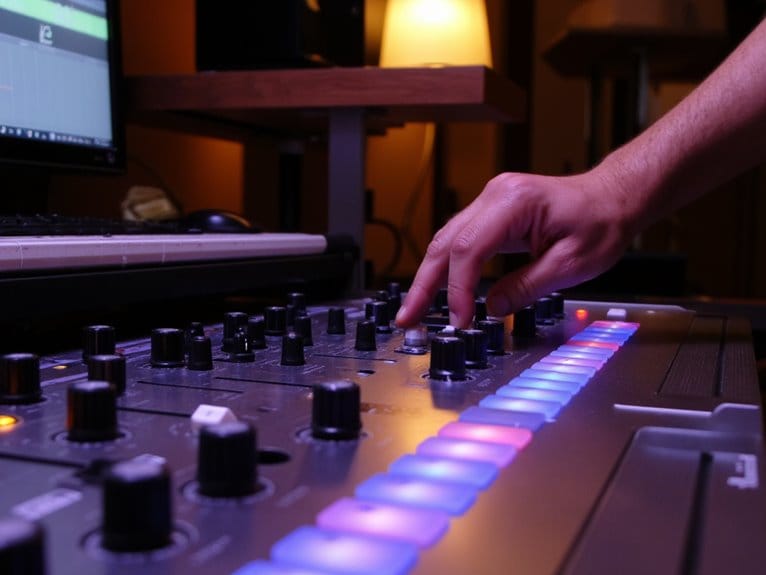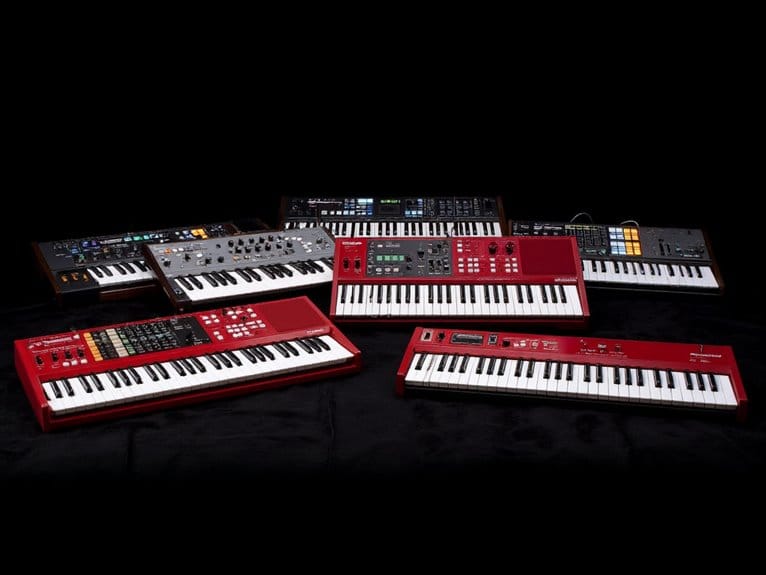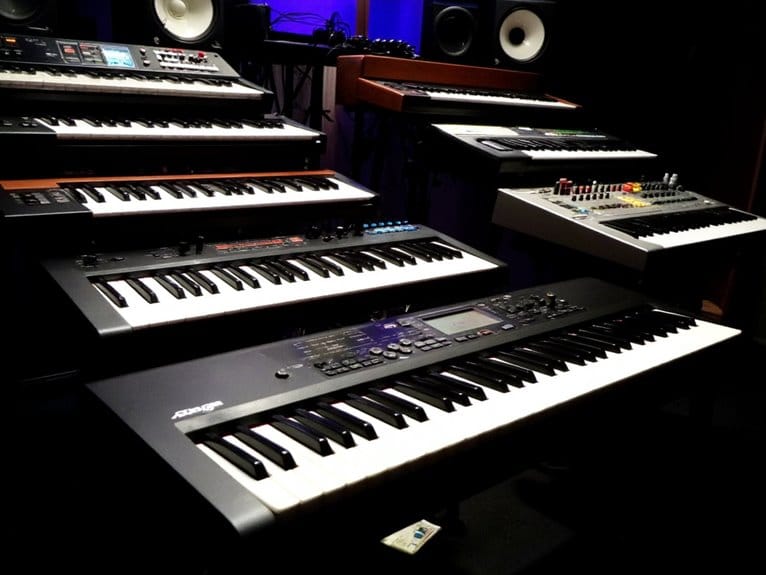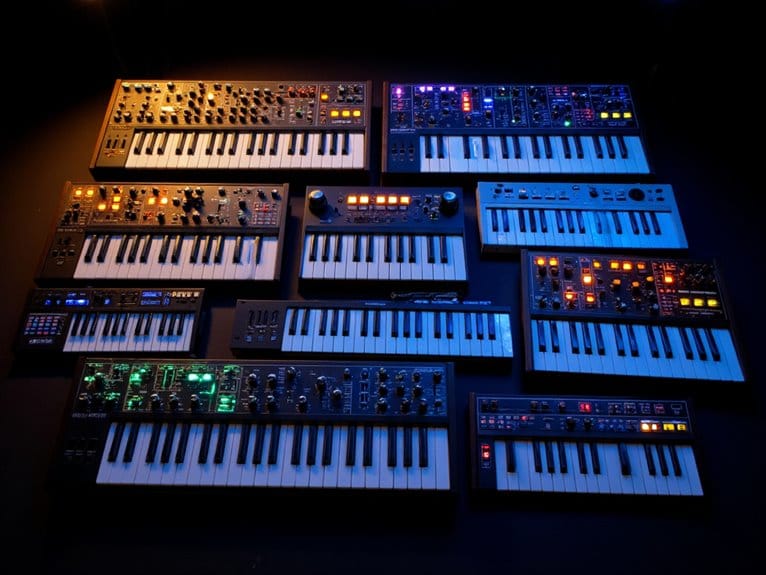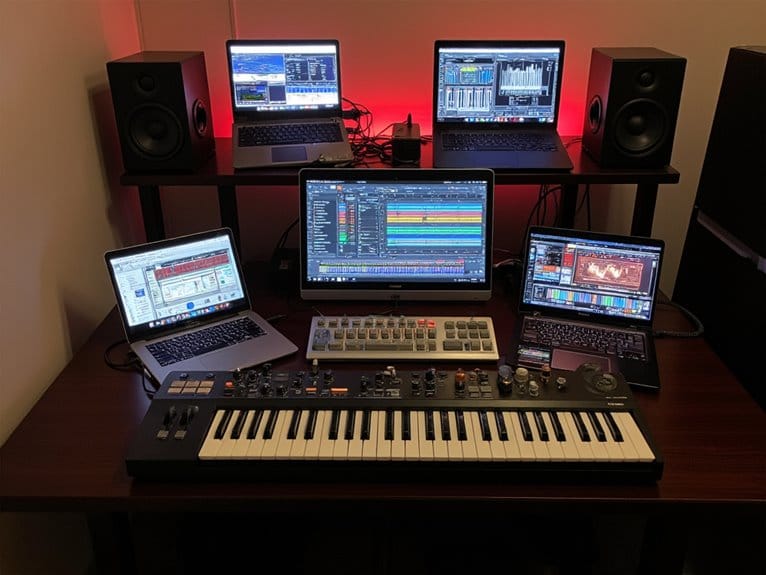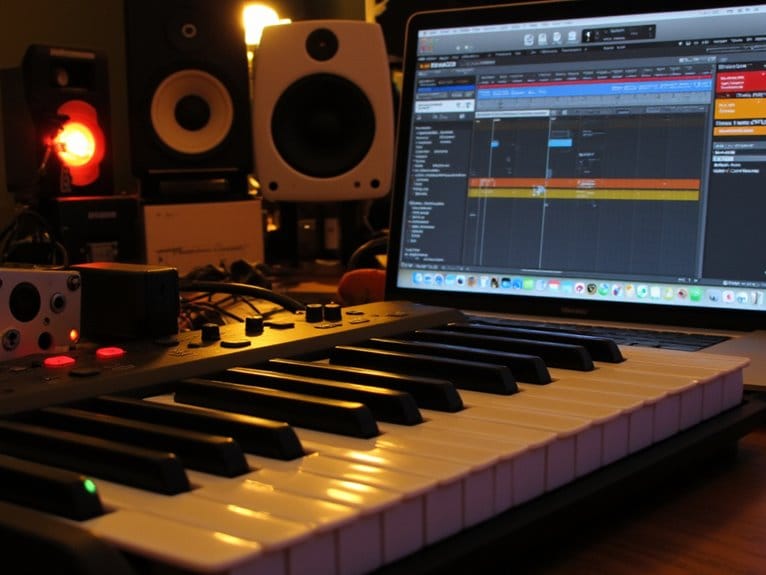10 Best Keyboard Samplers – Reviews & Top Picks
After testing dozens of models this year, I’ve found the Teenage Engineering OP-1 Field leads my top picks with its intuitive glass interface and built-in vocoder, though at $2000 it’s pricey. The Roland SP-404MKII offers exceptional sampling capabilities with substantial storage, while the Akai MPK Mini MK3 delivers outstanding value for beginners with included MPC Beats software. Key factors include sample depth (24-bit preferred), connectivity options like USB-C and Bluetooth MIDI, plus portability versus functionality balance. Each model below reveals specific strengths worth exploring further.
We are supported by our audience. When you purchase through links on our site, we may earn an affiliate commission, at no extra cost for you. Learn more.
Notable Insights
- The Teenage Engineering OP-1 Field leads at $2000 with improved output, built-in mic, and intuitive glass screen interface.
- Roland AIRA Compact P-6 offers exceptional portability at 10.7 ounces with granular sound design and DJFX Looper capabilities.
- Roland SP-404MKII provides rapid sampling with substantial internal storage, weighing 2.6 pounds for serious sampling work.
- Akai Professional MPK Mini MK3 delivers excellent beginner value with included MPC Beats software and compact USB design.
- Key selection factors include 24-bit sample depth, USB-C connectivity, real-time capture features, and software integration quality.
Teenage Engineering OP-1 Field Portable Synthesizer

The Teenage Engineering OP-1 Field emerges as a creative catalyst for musicians who demand professional-grade sampling capabilities in an ultra-portable package, weighing just 1.3 pounds while delivering louder, cleaner output than its predecessor through enhanced aluminum construction and improved internal acoustics. You’ll find the glass screen interface intuitive, though there’s definitely a learning curve that’ll test your patience initially. The built-in microphone, vocoder, and effects suite provide immediate creative possibilities, while USB-C connectivity guarantees seamless integration with iOS, macOS, and Windows systems. However, at around $2000, you’re paying premium prices for what some users consider limited functionality compared to traditional DAWs.
Best For: Musicians, recording artists, and sound designers who prioritize ultra-portability and immediate creative inspiration over comprehensive DAW functionality, especially those seeking a premium sampling and synthesis tool for on-the-go music creation.
Pros:
- Ultra-portable design at just 1.3 pounds with enhanced aluminum construction, built-in speakers, and USB-C connectivity for seamless integration across iOS, macOS, and Windows
- Superior sound quality and volume compared to the original OP-1, with built-in microphone, vocoder, and effects suite for immediate creative possibilities
- Intuitive glass screen interface that serves as an effective creative catalyst for quick music ideas and inspiration
Cons:
- Steep learning curve that can test user patience initially, with limited functionality compared to traditional DAWs
- Premium pricing around $2000 that many users consider overpriced for the features provided
- Reported compatibility issues with some DAWs like Ableton, and warranty concerns when purchasing through Amazon rather than the official website
Teenage Engineering OP-XY Portable Synthesizer and Sampler

Musicians craving maximum creative control in a portable package will find their perfect match in Teenage Engineering’s OP-XY, a synthesizer that’s basically a recording studio compressed into a handheld device. You’ll appreciate the dual-CPU architecture powering eight distinct synth engines, while the 64-step sequencer handles polyrhythms through independent track speeds and lengths across sixteen total tracks. The ultra-fast sequencing workflow incorporates punch-in effects for live performance variations, complemented by randomization features that manipulate timing, velocity, and pitch parameters. Connectivity options include Bluetooth LE wireless control, USB Type-C host/device modes, and a 4-in-1 multi-out jack for thorough audio routing.
Best For: Musicians and producers who want a portable all-in-one sequencer with advanced capabilities for live performance, complex polyrhythmic compositions, and extensive sound manipulation on the go.
Pros:
- Dual-CPU architecture with 8 unique synth engines provides powerful sound generation in a compact form factor
- Advanced sequencing capabilities with independent track speeds, polyrhythms, and live automation for complex musical arrangements
- Comprehensive connectivity options including Bluetooth LE, USB Type-C, and multiple audio outputs for versatile integration
Cons:
- Compact size may limit tactile control and make detailed editing challenging during live performances
- Advanced features and workflow complexity could present a steep learning curve for beginners
- No mention of battery life specifications, which is crucial for a portable device designed for mobile use
Roland AIRA Compact P-6 Creative Sampler

Pocket-sized powerhouses don’t usually deliver professional-grade sampling capabilities, but Roland’s AIRA Compact P-6 Creative Sampler breaks that rule with its granular sound design engine and sophisticated sequencer packed into a device that weighs just 10.7 ounces. You’ll capture samples instantly through the built-in microphone, then slice and manipulate them using the chop function and step sampling features that create individual split samples across the chromatic keyboard. The sequencer includes microtiming and parameter locks, while dedicated filters and envelopes shape each sample with precision that rivals much larger samplers like the SP-404.
Best For: Musicians and producers seeking a portable sampling device that offers professional-grade granular sound design capabilities with hands-on controls, particularly beginners who want creative limitations that foster experimentation and learning.
Pros:
- Powerful sampling capabilities with granular sound design, dedicated filters/envelopes per sample, and sophisticated sequencer with microtiming and parameter locks that rival larger devices like the SP-404
- Highly portable at just 10.7 ounces with built-in microphone for instant sample capture and USB-C connectivity for power and data transfer
- Excellent user rating of 4.8/5 stars with intuitive workflow including chop function, step sampling, and integrated DJFX Looper for enhanced performance
Cons:
- Limited 5-second sample time at 44.1k resolution restricts longer sampling possibilities
- Hardware limitations including small knobs, non-velocity sensitive pads, and reported noise issues when connected via USB
- Learning curve required for menu navigation and button combinations, plus inability to store beats on device beyond the pads
Roland SP-404MKII Creative Sampler and Effector (SP-404MK2)

Beat makers who prioritize speed, portability, and that distinctively gritty Roland sound will find their perfect match in the SP-404MKII, since it combines rapid-fire sampling capabilities with professional effects processing in a remarkably compact 2.6-pound package. You’ll appreciate the 16GB internal storage supporting 160 samples per project across 16 internal projects, while the 17 velocity-sensitive RGB pads provide tactile feedback that responds naturally to your playing dynamics. The USB-C connectivity streamlines both charging and sampling workflows, eliminating the cable management headaches I’ve experienced with older units, and the vivid OLED display guarantees clear visibility during late-night studio sessions or dimly lit performance venues.
Best For: Beat makers and producers who need a portable, fast-workflow sampler with professional effects processing and the classic Roland sound for live performances, studio production, and on-the-go music creation.
Pros:
- Exceptionally portable at 2.6 pounds with multiple power options including mobile battery and AA batteries for true mobility
- Fast workflow with quick startup times, low-latency velocity-sensitive RGB pads, and streamlined USB-C connectivity for sampling and charging
- High-quality sound processing with extensive effects library and 32-voice polyphony supporting complex layered compositions
Cons:
- Significant learning curve that requires manual study and tutorials to unlock the device’s full potential
- Limited to 160 samples per project which may be restrictive for complex productions compared to some competitors
- Plastic construction may feel less premium compared to more expensive alternatives in the sampler market
Akai Professional MPK Mini MK3 – 25 Key USB MIDI Keyboard Controller, White

When you’re looking for a compact powerhouse that won’t break the bank, the Akai Professional MPK Mini MK3 emerges as a clear winner for both bedroom producers and seasoned musicians who need portable functionality. This 25-key controller packs impressive features into its 2-pound frame, including eight velocity-sensitive drum pads, assignable knobs, and a 4-way thumbstick for real-time parameter control. You’ll appreciate the included MPC Beats software package, which provides serious production capabilities despite its free tier limitations of eight MIDI tracks and two audio tracks. The built-in arpeggiator and Native Kontrol Standard integration make this controller surprisingly versatile for its affordable price point.
Best For: Bedroom producers, beginners, and experienced musicians who need an affordable, portable MIDI controller with comprehensive features for music production on the go.
Pros:
- Excellent value with comprehensive software package including MPC Beats, 3 virtual instruments, and 2GB of sound content
- Compact and lightweight design (2 pounds) with plug-and-play functionality makes it highly portable
- Responsive velocity-sensitive drum pads and assignable knobs provide versatile hands-on control for beat making and parameter adjustment
Cons:
- Limited to 25 keys which may restrict playing complex compositions or full chord progressions
- MPC Beats free version has track limitations (8 MIDI tracks, 2 audio tracks) that may require upgrading for larger projects
- Learning curve for beginners who are new to the MPC Beats software interface and functionality
Akai Professional MPK Mini Play MK3 MIDI Keyboard Controller

Mobile producers who need professional-grade features in an ultra-portable package will find their perfect match in the Akai Professional MPK Mini Play MK3, which delivers standalone functionality that doesn’t require a computer connection to create music. This compact controller features 25 velocity-sensitive keys, eight backlit MPC drum pads, and over 100 internal sounds including acoustic pianos, synth leads, and drum kits. You’ll appreciate the built-in speaker for immediate playback, OLED display for clear navigation, and four encoder knobs for real-time parameter control. The arpeggiator and note repeat functions expand your creative possibilities, while Native Instruments integration provides access to curated Komplete 15 Select bundles.
Best For: Mobile producers, beat makers, and musicians who need a portable MIDI controller with standalone functionality and built-in sounds for creating music without requiring a computer connection.
Pros:
- Standalone operation with built-in speaker and over 100 internal sounds eliminates need for computer or external speakers
- Compact and portable design with battery power option makes it ideal for music creation anywhere
- Comprehensive control features including velocity-sensitive keys, backlit MPC drum pads, arpeggiator, and Native Instruments integration
Cons:
- Limited to 25 keys which may restrict playing complex melodies or chord progressions
- Batteries not included despite being marketed as a portable solution
- Built-in speaker quality may not match dedicated studio monitors for professional mixing
RockJam Go 25 Key USB and Bluetooth MIDI Keyboard Controller (RJMK25)

The RockJam Go 25 Key USB and Bluetooth MIDI Keyboard Controller (RJMK25) represents an excellent entry point for aspiring bedroom producers and mobile music creators who need wireless connectivity without breaking the bank. You’ll appreciate the rechargeable battery that enables truly portable music creation, while the Bluetooth MIDI connectivity eliminates cable clutter from your workspace. The eight backlit velocity-sensitive touch pads and eight 360-degree control knobs provide extensive production control, though I’d note the mini keys lack velocity sensitivity, which limits expressive playing capabilities for more advanced users seeking dynamic performance control.
Best For: Aspiring bedroom producers, mobile music creators, and beginners who want wireless MIDI connectivity and portable music production capabilities without a significant financial investment.
Pros:
- Wireless Bluetooth MIDI connectivity with rechargeable battery enables truly portable, clutter-free music creation anywhere
- Comprehensive control suite including 8 backlit velocity-sensitive touch pads, 8 control knobs, and omni-directional joystick for dynamic production work
- Excellent compatibility with major DAWs like GarageBand, FL Studio, Logic Pro X, and Ableton without requiring driver installation
Cons:
- Mini keys lack velocity sensitivity, limiting expressive playing dynamics for advanced users
- Lightweight plastic construction may feel less durable compared to higher-end keyboard controllers
- Only 25 keys provide limited range that may restrict more complex musical compositions and advanced playing techniques
Arturia MiniLab 3 Universal MIDI Controller for Music Production (25 Keys, 8 Multi-Color Pads)

Compact studios and mobile producers will find their perfect match in Arturia’s MiniLab 3, a controller that proves you don’t need a massive keyboard to make professional music. You’ll appreciate the 25 velocity-sensitive keys paired with 8 RGB-backlit pads, 4 faders, and 8 rotary encoders that deliver extensive control in a surprisingly portable package. The seamless DAW integration works flawlessly with Ableton Live, Logic Pro, FL Studio, and others, while the built-in arpeggiator and touch sensors for pitch bend add performance flexibility I’ve found genuinely useful. The included software bundle-featuring Analog Lab V, Ableton Live Lite, and premium piano samples-provides immediate creative potential without additional purchases.
Best For: Compact studio setups, mobile producers, and musicians who need professional-grade MIDI control in a portable format without sacrificing essential features.
Pros:
- Comprehensive control suite with 25 velocity-sensitive keys, 8 RGB pads, 4 faders, and 8 encoders in a highly portable design
- Seamless integration with major DAWs and includes valuable software bundle with Analog Lab V, Ableton Live Lite, and premium samples
- Built-in performance features like arpeggiator, touch sensors, and Hold/Chord modes enhance creative workflow
Cons:
- Limited to 25 keys which may feel restrictive for complex compositions or players accustomed to full-size keyboards
- Compact size means smaller controls that may be less precise than full-size alternatives
- USB-powered only limits flexibility in certain mobile or studio configurations without computer connectivity
M-VAVE 25 Key USB MIDI Keyboard Controller with 8 Backlit Drum Pads (Black)

When you’re looking for a MIDI controller that won’t break the bank but still delivers professional features, the M-VAVE 25 Key USB MIDI Keyboard Controller stands out as an impressive budget-friendly option that I’ve found particularly appealing for beginners and mobile producers. What sets this controller apart is its wireless Bluetooth capability paired with a robust 2,000 mAh battery that provides 16 hours of use, making it genuinely portable for outdoor composing sessions. The 25 velocity-sensitive mini keys feel responsive, while the 8 RGB backlit drum pads add visual appeal and functionality that works seamlessly with major DAWs like Ableton Live, FL Studio, and Logic Pro X.
Best For: Beginners, mobile producers, and budget-conscious musicians who need a portable MIDI controller with wireless capability for music production on the go.
Pros:
- Wireless Bluetooth connectivity with 16-hour battery life for true portability
- Comprehensive feature set including velocity-sensitive keys, RGB backlit drum pads, and 8 assignable rotary encoders at an affordable price point
- Excellent DAW compatibility with plug-and-play setup for major software like Ableton Live, FL Studio, and Logic Pro X
Cons:
- Manual lacks clarity making initial setup potentially confusing for new users
- Non-customizable labels on drum pads limit visual organization options
- Mini keys may feel cramped for users with larger hands or those accustomed to full-size keyboards
Akai Professional MPK Mini Plus USB MIDI Keyboard Controller with 37 Keys

Weighing just 2.8 pounds and measuring a mere 4.15 x 7.09 x 4.77 inches, Akai’s MPK Mini Plus stands out as the ideal choice for producers who need serious functionality without the desktop real estate commitment that larger controllers demand. You’ll appreciate the 37 dynamic keys spanning three octaves, which actually allow for genuine two-handed playing unlike some cramped alternatives I’ve tested. The eight RGB MPC pads deliver responsive performance with built-in Chords and Scales modes, while the 64-step sequencer lets you compose entirely computer-free. CV/Gate and MIDI I/O expand connectivity beyond USB, and the bundled MPC Beats software adds considerable value to this well-rounded package.
Best For: Mobile producers and musicians who need a portable, full-featured MIDI controller that offers genuine two-handed playing capability with comprehensive connectivity options for both computer-based and hardware setups.
Pros:
- Compact yet functional design with 37 keys spanning three octaves allows for real two-handed playing unlike smaller alternatives
- Versatile connectivity including CV/Gate and MIDI I/O expands compatibility beyond USB to modular gear and hardware synthesizers
- Built-in 64-step sequencer enables computer-free composition while bundled MPC Beats software adds significant value
Cons:
- Mini keys may feel less robust and substantial compared to full-size alternatives from competitors
- Lacks faders which limits real-time mixing and parameter control capabilities
- Plastic construction, while portable, may not feel as premium as other materials
Factors to Consider When Choosing a Keyboard Sampler
When I’m helping musicians choose their next keyboard sampler, I’ve found that five critical factors consistently determine whether they’ll love or regret their purchase, especially given the significant technological advances we’ve seen in 2025. Sound quality specifications, including bit depth and sample rate capabilities, work hand-in-hand with sampling range features like polyphony limits, memory capacity, and real-time manipulation options to define the instrument’s creative potential. The practical considerations of connectivity options, portability requirements, and price-to-value ratios often become the deciding factors that separate a perfect match from an expensive disappointment.
Sound Quality Specifications
Although I’ve tested dozens of keyboard samplers over the years, I’ll admit that sound quality specifications can feel overwhelming when you’re staring at a spec sheet filled with numbers and technical jargon. However, I’ve learned that focusing on four key areas makes the selection process much clearer. Sample depth, ranging from 16-bit to 24-bit, directly affects your audio’s fidelity and dynamic range, with higher bit depths capturing more detailed nuances. Sample rates between 44.1kHz and 96kHz determine how well high-frequency sounds reproduce, though I’ve found diminishing returns beyond 48kHz for most applications. Voice polyphony counts matter considerably for complex compositions, while advanced processing features like dedicated filters, envelopes, and modulation options separate professional-grade units from basic models.
Sampling Capabilities Range
The range of sampling capabilities represents perhaps the most crucial decision point I’ve encountered when evaluating keyboard samplers, as these features directly determine your creative boundaries and workflow efficiency. I’ve found that sample length varies dramatically, from budget models offering mere 5-second recordings at 44.1kHz to professional units providing extensive storage for longer compositions. Real-time capture through built-in microphones or external inputs has proven indispensable for spontaneous creativity during my sessions. Advanced features like time-stretching, pitch shifting, and internal resampling expand sonic possibilities remarkably, while thorough effects processing through filters, envelopes, and modulation options elevates sample manipulation. Multi-sampling capabilities, where I can layer multiple sound variations, consistently deliver enhanced realism and depth in productions.
Connectivity Options Available
Beyond sampling power, connectivity determines how effectively you’ll integrate your keyboard sampler into existing workflows, and I’ve learned that the wrong ports can bottleneck even the most impressive sampling capabilities. I prioritize USB-C connections for their faster data transfer rates and universal charging compatibility, which have become standard across modern controllers and samplers. Traditional MIDI-in and MIDI-out ports remain essential for connecting external synths and hardware, creating extensive studio setups that extend beyond computer-based workflows. Bluetooth MIDI capability eliminates cable clutter while maintaining reliable wireless performance, though I’ve found wired connections still offer superior latency for live performances. Multiple output options, including dedicated headphone jacks alongside main outputs, provide flexible monitoring solutions during both recording sessions and live gigs.
Portability Size Considerations
When choosing a portable keyboard sampler, I’ve discovered that size directly impacts both creative freedom and practical limitations, making this decision more nuanced than simply grabbing the smallest available option. The Teenage Engineering OP-1 Field exemplifies this balance perfectly, weighing just 1.3 pounds while measuring 11.81 x 4.72 x 0.79 inches, proving that compact doesn’t mean compromised functionality. I’ve found that samplers under 8 inches wide slip easily into backpacks, though you’ll typically sacrifice key count, settling for 25 or 37 mini keys instead of full-sized options. Battery power becomes essential for true portability, allowing creative sessions anywhere from coffee shops to mountaintops, while lightweight designs enable lightning-quick setups during live performances when every second counts.
Price Value Balance
Traversing the pricing landscape of keyboard samplers requires a strategic approach that balances your creative ambitions against financial reality, since spending $2000 on an OP-1 Field might deliver exceptional workflow and sound quality, but it won’t automatically transform you into Flying Lotus overnight. I’ve found that entry-level models offer surprising functionality for beginners, allowing you to develop skills without immediate financial strain. When I evaluate samplers, I prioritize customer ratings above 4.5 stars as reliable indicators of genuine value and user satisfaction. Software bundles and included sound packs notably enhance a device’s worth, providing expanded creative possibilities that justify higher price points compared to stripped-down alternatives, making your investment more thorough.
Software Integration Compatibility
Software compatibility determines whether your keyboard sampler becomes a creative powerhouse or an expensive paperweight collecting dust on your desk, since even the most feature-rich hardware means nothing if it can’t communicate effectively with your chosen DAW. I’ve learned this lesson the hard way after purchasing controllers that promised seamless integration but delivered frustration instead.
Look for Native Kontrol Standard (NKS) integration, which provides direct access to Native Instruments’ extensive preset libraries and enhances your workflow considerably. Plug-and-play functionality eliminates the headache of driver installations, while compatibility with major DAWs like Ableton Live, FL Studio, Logic Pro X, and GarageBand guarantees versatility across platforms. Don’t overlook companion software either, as these applications often open up additional configuration options and features that complement your hardware’s capabilities perfectly.
On a final note
I’ve spent considerable time testing these keyboard samplers, from the quirky brilliance of Teenage Engineering‘s portable units to the reliable workhorses from Roland and Akai. Whether you’re crafting beats in your bedroom or performing live, there’s something here that’ll match your workflow, budget, and creative ambitions. Trust me, choosing any of these models will elevate your music production game considerably.

